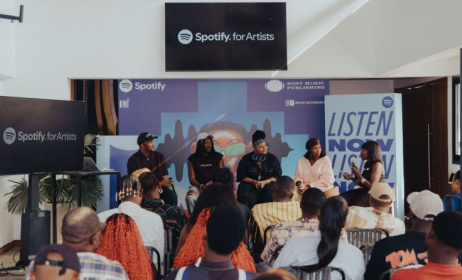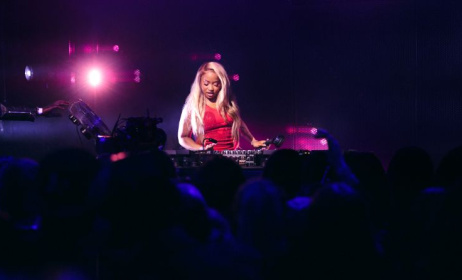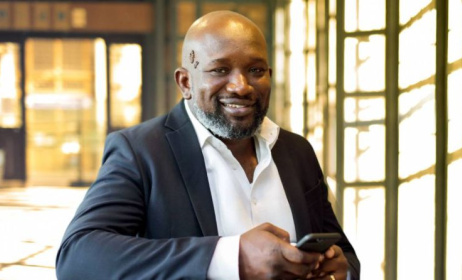Amaarae: A global perspective is forming around my music
For many, Ghanaian-American artist Amaarae’s sound occupies Afropop’s fringe. Her style is characterised by wide-ranging experimentation. It is fiercely original – an instantly immersive tapestry of Afro-fusion, pop-punk, alt-R&B and progressive house. This makes her one of this generation’s most exciting new voices. But creative innovation also runs the risk of going over people’s heads. Ask any jazz musician.
 Amaarae.
Amaarae.
Born Ama Serwah Genfi in New York City, the sultry-voiced 26 year old was raised between Ghana, Georgia and New Jersey. She harnessed this cross-cultural upbringing in the creation of dense, almost psychedelic compositions. In all of this, her West African roots serve as a sonic foundation. Like her West African colleagues, Omah Lay and Tems, Amaarae is now labelled a modern music pathfinder. She acknowledges this role, which she has embodied as an independent act since 2017, saying that the tag did not pose any challenges but served as an important learning experience.
Amaarae notes that being a trendsetter means that she gets to inspire the new generation by sparking fresh ideas. “And that’s not challenging for me at all. I enjoy finding new ways of expression and new ways of storytelling that I know can propel the next generation of artists further into their ways of thinking and doing,” she says.
In January, the singer was named Apple Music’s latest Africa Rising artist. Omah Lay and Tems are alumni of the programme, which is designed to elevate the careers of African artists. This isn’t the first time Apple Music has highlighted Amaarae’s talent: in April 2018, the streaming platform called her one of its most exciting new artists.
Part of the reason for Amaarae’s Africa Rising feature is her groundbreaking 2020 debut album The Angel You Don’t Know. The 14-track offering is her second-ever collection, after 2017’s Passionfruit Summers EP – which is as boldly unorthodox.
Amaarae says the goal of the new album is to epitomise today’s quintessential young African woman, her experiences and her approach to life.
“We’re liberated mentally, emotionally, sexually, financially,” she says. ”We are also telling our stories in a much more refined way with a global perspective. We are much more confident than our mothers and our grandmothers. We are much more empowered, and I think that’s what The Angel You Don’t Know communicates.”
The project has already gained global recognition, with publications like Pitchfork, The Guardian, The New Yorker and Clash Magazine applauding its unique vision.
“I think it has done incredibly well, especially in countries like Nigeria, which is incredibly supportive of me and of my music. It has also been interesting to see how it’s taking shape and how we’re building that relationship with the Western world, especially in the US seeing radio stations in Seattle, Utah, Los Angeles and New York playing it – and just seeing how it’s creating an interesting bridge. People who don’t know our culture are now able to connect with it in a much lighter and broader sense, so the reception has been incredible.”
Despite her growing international acclaim, Ghanaian fans seem to be missing something about her sound; her popularity in the country lacks despite key collaborations with big acts like Stonebwoy and Edem. She has also received constant praise from M.anifest. Could her dual national identity be to blame? After all, the Ghanaian music scene can be inward-looking. And how much is her choice to perform mainly in English responsible for timid Ghanaian acceptability?
Amaarae says everyone has been carving their own narrative about how Ghanaians interpret her sound. Her focus, however, is to continue to “put out my music for those who want to enjoy it, and I celebrate with those who want to enjoy it. For the people here, if they like it, they like it. If they don’t, they don’t. If they want to support it, they will.”
“There is a whole world out there – from Nigeria to southern Africa, Kenya, Namibia, Ivory Coast, Germany, France, the UK, US, Korea and Japan – that’s enjoying my music, and we are building a community,” she adds. “There are places like Brazil enjoying what I’m doing, so why would I focus on just a territory that’s not interested when there is a whole wide world – a whole global perspective that’s forming around my music? I don’t think it makes sense. If they catch up over here, that’s great. If they don’t, that’s unfortunate.”
In the meantime, Amaarae is occupied with curating Spotify’s Black to the Future playlist as part of Black History Month in the US. The streaming giant says Amaarae’s selection will “help capture Afrofuturism in all its wild, otherworldly musical dimensions.”


































Comments
Log in or register to post comments